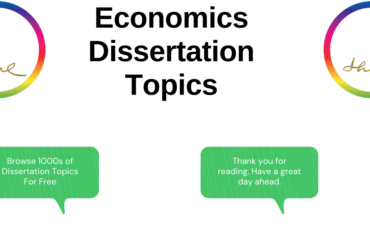Psychology Dissertation Topics
A psychology dissertation must offer a substantial contribution to the corpus of knowledge in the area. Typically, such an argument is predicated on prior research and should demonstrate a solid understanding of the subject area. A compelling rationale, such as filling a gap in the study literature, is critical for a successful psychology dissertation. Dissertations must generally follow a prescribed framework while simultaneously attempting to establish or refute a theory based on the investigator’s personal observations and prior study in the topic. On the other hand, the objective of qualitative psychology dissertations is to investigate and answer a specific research issue, rather than to validate an established premise. The research objectives and techniques must be precise and follow a predefined framework. The dissertation’s title should be succinct and direct, representing the paper’s primary ideas. Additionally, the research mentioned must be properly connected to the research objective. Most crucially, not only must prior research be critically analysed to demonstrate the need for the dissertation, but the dissertation itself must also be critically examined. If the hypothesis is affirmed or denied, the conclusion should summarise and convey the major arguments. In qualitative research, on the other hand, the discussion and conclusion must address the extent to which the study issue has been examined. There are plenty of psychology dissertation topics that you can consider picking.
Editingarsenal has compiled a list of some of the most popular and common dissertation topics from a variety of academic disciplines, so you can pick and choose what to write about. If you need dissertation editing assistance , don’t hesitate to contact one of our qualified and experienced editors and proofreaders.
Cognitive Psychology Topics
- Cognitive psychology is the study of the human brain’s information storage and retrieval mechanisms. It tries to understand the underlying processes through experiments, computer modelling, and neuropsychology. Theories seek to explain how information is encoded in the brain at both the macro and micro levels. This is a broad subject with various potential subtopics. If you intend to focus on cognitive psychology for your dissertation, the following are just a few possible psychology dissertation topics:
- Pain perception is influenced by expectations, attentiveness, and emotional states.
- The extent to which objective measures of awareness can be utilised to substantiate theoretical interpretations.
- The following are some of the drawbacks of the modular view of the brain: The relevance of feedback and cross-modulation cannot be emphasised in information processing.
- Is it true that indirect and direct models of perception are mutually exclusive, or might recent enactive accounts point the way forward?
- Implicit intergroup cognition development in respect to in- and out-groups: social or pre-specified?
- How might research on baby bilingualism and trilingualism show the extent to which the brain’s representational systems encoding several languages interact?
- The concept of ” grandmother cells ” helps to explain why neurons prefer high-level information processing, such as facial recognition.
- The association between impairments in social cognition, emotion, and anxiety disorders.
- The significance of implicit visual processing in object recognition: brain processes and routes
- Changes in neuronal processing in response to event segmentation: untangling cause and effect in border recognition
- Is the aggregate larger than the parts? Consciousness is best explained as an output of implicit processes: this has consequences for comprehending intentionality.
- More than any other portion of the cortex, the prefrontal cortex is crucial in defining what makes humans human.
- The prefrontal cortex’s function is best understood when seen in connection to other brain regions.
- Language is best explained as the result of various overlapping neuronal circuits that occur throughout the cortex, rather than as the result of distinct brain locations.
- While neural network theories can account for some lower order processes of the brain, they cannot account for higher order representations: is this supported by evidence?
- As information travels from sensory-specific early brain regions to higher brain regions, representations become increasingly integrated: implications and consequences.
- Contribution of the cerebellum to the cortex’s higher functions.
- The plasticity of the mature human brain is limited.
- Are MRI scans a valid predictor of brain function?
- The assertion that the right and left hemispheres of the brain interpret information differently is crucial for comprehending how the brain operates.
- Parallel distributed processing is incapable of understanding the human brain’s higher cognitive processes.
- In comparison to competing modern ideas, Baddeley’s model of working memory.
- Working memory is best explained as a function of long-term memory.
- The evidence supports the hippocampus’s role in memory creation and consolidation: implications for neurodegenerative illnesses such as dementia.
- Biases in visual working memory and attention.
- Working memory and the prefrontal cortex.
- The relationship between emotional memory and episodic memory.
- Attention is contingent upon the gradual activation of forward brain areas.
- Attention is more appropriately understood as a multivariate concept than as a unimodal term.
- View-dependent theories of vision are more successful in accounting for natural perception than view-independent theories.
- Computer models of how perception occurs can lead to a misunderstanding of how the mechanisms of perception actually operate.
- How visual illusions aid in the comprehension of perceptual processes.
- Assessing the validity of Gibson’s theory of direct perception compared to constructivist accounts and more recent cognitive theories.
- Why does the sense of time vary according to circumstances?
- Is memory for past events partially influenced by the situation or context in which recall takes place?
- Effective cognition is about selecting appropriate information at the right time in the correct order.
- Does subliminal perception exist or is it part of a more complex phenomenon?
- Hierarchical explanations of information flow and parallel distributed processing.
- Can fMRI measures be used to accurately identify and distinguish deceptive information from guilty knowledge?
- The reliability, validity, and usefulness of research findings from cognitive psychology applied to real-life behaviour and cognition.
- The Network Neuroscience Theory: is general intelligence in humans a consequence of individual differences in neural network structure and architecture?
Social Psychology Topics
- Social psychology is the study of how people interact in groups. This is performed through examining how the behaviour of others influences one’s own. Among other things, social impact, attitudes, and nonverbal communication can be examined in controlled conditions, most notably in laboratory experiments but also in field investigations. The primary preoccupation is with immediate social connections. Despite this, qualitative research methods such as interviews and focus groups are gaining popularity in social psychology because they provide in-depth explanations of social psychology. The following are some suggestions for social psychology dissertation topics:
- Factors regulating the degree and duration of automatic priming’s social behavior-modifying effects
- The automated impacts of priming on complex real-world behaviour.
- Maintaining personal integrity and comprehending interpersonal connections are complicated by an overlapping brain network encoding the concepts of self and other.
- Game theory with an emphasis on human behaviour: An examination of how players acquire strategic thinking abilities through interaction with others.
- A social intuitionist approach for assessing the relative importance of logic and emotion in moral judgments.
- The researchers are examining in-group preference and the development of implicit social cognition in early children to determine how evaluation is given.
- Cognitive neuroscience can be used to trace the integration of social cognition and understanding of neural networks and systems.
- Computational collective behaviour models based on agents: a bottom-up approach to understanding groupings.
- Childhood and the establishment of nonverbal communication in children: a matter of chance or fate?
- Cognitive conflict and the Behaviour Stimulus Interaction (BSI) theory in approach/avoidance situations: The time span in which the effect of devaluation will be felt.
- Cognitive dissonance has a long-lasting ramification.
Abnormal Psychology Topics
- Psychopathology in adolescence and adulthood is the scientific study of abnormal behaviour with the goal of better understanding and treating these persons. The term “abnormal” refers to an individual who exhibits psychological qualities that are out of the ordinary. This branch of psychology is for students interested in learning about less prevalent disorders than the ones they are studying. Selecting one of the following themes will make conducting research for your psychology dissertation easier.
- Is the DSM-V a reliable classification system for psychiatric symptoms that are out of the ordinary?
- Dissociable limbic system disruption networks are connected with substance abuse subtypes.
- The role of the anterior cingulated cortex in comprehending schizophrenia’s cognitive abnormalities.
- Dysfunction of the amygdale and ventromedial prefrontal cortex in psychopathology: a review.
- Schizophrenia is being studied as a multifaceted condition.
- The extent to which marijuana usage inhibits an individual’s capacity to multitask.
- According to neurobiological hypotheses, schizophrenia is caused by aberrant fronto-temporal lobe connections, which can be tested via MRI investigations.
- Is blaming autism on a malfunctioning mirror neuron system sufficient, or do cognitive models of social behaviour and other reasons for the disease also need to be considered?
- Face processing problems in ASD are almost certainly the result of social or visual impairments.
- Is a deficiency in category-specific knowledge or a more distributed processing system indicative of category deficiencies?
- On the other hand, schizophrenia patients are more prone to experience auditory hallucinations than visual hallucinations.
- Is it more beneficial to treat phobias with medicine, cognitive retraining therapy, behavioural strategies, or psychological approaches?
- Do autistics who exhibit only a few unique abilities suggest a viable explanation for the disorder’s aetiology?
- Examining the signs and symptoms of attention deficit hyperactivity disorder in children and adults: Is adult attention deficit hyperactivity disorder a distinct disorder?
- What are the distinctions between those with schizophrenia and those with normally functioning cognitive processes?
- What are the most significant distinctions between Autism Spectrum Disorders (ASD) and intellectual development disorders (IDD)?
Evolutionary Psychology Topics
- This field makes an attempt to understand psychological features through the lens of evolutionary theory based on natural selection and adaptability. Throughout evolutionary history, humans have acquired psychological systems that have aided them in coping with long-term issues, which is a good thing. Individuals’ behaviour in the modern era is believed to be restricted by such systems. To study about psychology’s evolution, you can conduct research into human history and apply your findings to a variety of contemporary challenges, such as organisations. Both the author and reader may find it enjoyable to write a psychology dissertation on this subject.
- How robust is evolutionary psychology as a model for researching human behaviour?
- Evaluating reciprocal altruism’s validity as a theory for explaining benevolence in a range of social circumstances.
- Why cannot the intricacies of human social behaviour be explained solely by individual qualities or cognitive modules?
- Compatibility is determined by examining features such as facial symmetry, averageness, and secondary sex characteristics.
- Analyze the validity of artificially produced evolutionary game theory studies used to analyse human behaviour in the actual world.
- Using the parental investment theory, comparing gender disparities in emotional outlook between primary biological and primary non-biological caregivers.
- Recognize the difference between learnt and adaptive fears and anxieties.
- Humans are no different in terms of social trade behaviour. They employ the same cognitive thinking that they do in all other situations.
- Is language-based general learning a more accurate description of human mental abilities, or is there a more specific mechanism?
- Human cognition development is a stoichiometric sign of brain evolution.
- What distinguishes humans from other animals are the executive functions of the frontal lobe.
- Considerations in light of new neuroscientific studies on Fodor’s notion of the brain as a modular structure.
- How likely is it that a cheater detection module will exist in the real world?
- Ethnographic instances as a trustworthy predictor of universal human talents.
- Evolutionary restrictions account for disparities in self-perception between men and women.
- What role does evolutionary psychology play in the oddities of human decision-making?
- Evolutionary psychology of group behaviour may be able to account for both logical and irrational human behaviour in organisations.
- How well-suited is Darwinian sexual selection theory for explaining cultural diversity and emotional expression?
Personality Topics
- In psychology, personality refers to an individual’s distinct set of characteristics that shape their behaviour in various contexts. By examining how individuals differ and resemble one another, we can gain a deeper understanding of personality psychology. Numerous academics have attempted to establish universally applicable characteristics, while others have delved further into the intricacies of personality traits. The following are some possible psychology dissertation themes for your paper:
- The purpose of this study is to determine whether the Health Personality Inventory can be used to predict teenagers’ risk of substance abuse.
- Due to cognitive dissonance, extroverts and introverts behave differently when participating in group conversations.
- How are levels of perfectionism related to attitudes about success and failure?
- Is it possible to use personality inventories to reliably assess diverse personality traits?
- Is it possible to predict adult personality profiles using the features identified by young children?
- Identifying the critical characteristics and cognitive components that contribute to the varied nature of creativity.
- The link between substance abuse and personality type: sensation seekers vs internally conflicted individuals.
- Personality and decision-making are influenced by impulsivity and rational thought.
- First impressions are critical in defining personality traits.
- Identification of personality characteristics connected with extroversion and introversion can assist in identifying individuals at risk of suicide due to these characteristics.
- Which personality inventories are the most effective when it comes to assessing personality?
- How much can the personality of an individual change over time?
- Utilization of personality inventories to screen for mental health problems.
- How well the current method of diagnosing personality disorders is working.
Popular Psychology Topics
- What effect does colour have on sports performance?
- Color’s emotional influence.
- What effect do colour and design have on our perception of time?
- Is it possible that language has an effect on our perception of the world?
- Is it true that language has an effect on our thought processes? The controversy surrounding linguistic relativity.
- Differences in how cultures process numbers.
- A thorough review of religion’s psychology.
- How is religion related to mental health?
- The consequences of cannabis use on the bodies and minds of healthy individuals.
- The effect of marijuana on creative thinking.
- A thorough examination of memory models.
- Is it possible to improve grades through memory techniques?
- Is it feasible that mindfulness practise can benefit one’s mental health?
- The twentieth-century evolution of psychological movements.
- The effect of personality characteristics on an individual’s creativity.
- Innovative thought necessitates an exhaustive examination.
- What effect does one’s environment have on one’s level of creativity?
- A thorough review of the psychology of happiness.
- Is there a link between social media use and happiness?
- How much does exposure to nature have an effect on our well-being?
- Is it feasible that physical activity might actually increase one’s pleasure level?
- Physical activity’s effect on one’s health and well-being.
- The effect of exercise on cognitive performance.
- How big of a boost do indoor plants bring in terms of productivity?
- How much influence do video games have on an individual’s health?
- How does sleep affect one’s well-being?
- Financial markets’ psychological impact on the general populace.
- The present cultural importance of sport psychology.
- The reaction of a generation to online pornography.
- Coming to terms with our own mortality is one of the most challenging aspects of life.
- Socioeconomic position and access to therapy are inextricably intertwined.
- To what extent does emotion impede our ability to make sound judgments?
- Effective therapies are used to treat psychological disorders.







